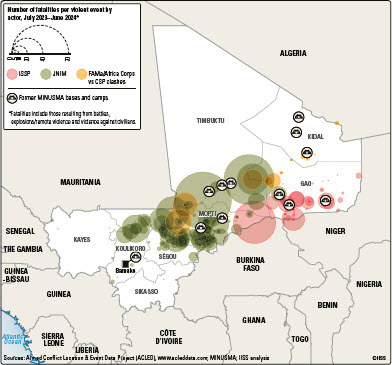
Globally facing violent events, terrorism becomes one of the most popular social issues. During the pandemic, it is often assumed that violent extremists from terrorism are deterred; however, this assumption is false. Lockdowns may act as an obstacle to terrorists plotting attacks in the real world, but several terrorist groups have also warned that government and security systems have been severely underutilized as a result of the outbreak. Therefore, it is clear that the threat of terrorism is one step closer to people’s lives, and terrorism during this era will have long-lasting consequences.
On March 11th, 2020, World Health Organization (WHO) declared the novel coronavirus outbreak a global pandemic. Between mid-March and mid-April, “violent attacks in the Sub-Saharan region’s hotspots rose by 37%”, according to the Armed Conflict Location & Event Data Project (ACLED) database. Additionally, they have begun to release pandemic related-propaganda as well. In the meantime, African states, like any other governments all over the world, are allocating military resources to the pandemic response, potentially undermining counterterrorism operations.
Extremists Exploiting COVID-19 to Expand Footprint
Extremist groups across sub-Saharan Africa are leveraging the Covid-19 crisis as an opportunity to intensify attacks and increase civilian support. On April 7th, US Africa Command (AFRICOM) commander Stephen Townsend warned that “al-Qaeda, al-Shabaab and ISIS see this crisis as an opportunity to further their terrorist agenda.” On March 25, Jama'at Nasr al-Islam wal Muslimin (JNIM) rebels kidnapped Malian opposition leader Soumaila Cisse after suspected jihadists allegedly killed 25 soldiers at a Malian army base on March 19. In that same week, Boko Haram's bloodiest offensive against Chadian forces led to the deaths of 92 soldiers. The district capitals of Moçimboa da Praia and Quissanga were simultaneously attacked on the same day by Mozambican insurgents in Cabo Delgado.
In addition to physical attacks, terrorist groups exploited propaganda to mobilize support. The Islamic State and al-Qaeda affiliates in Africa have spread a broad message that claims the epidemic is a sign of God's wrath against the West. The leader of Boko Haram, Abu Bakr Shekau, claimed that the restrictions imposed by the Nigerian government, such as physical and social distance, were an open assault on Muslims and urged his followers to resume praying at mosques. Moreover, Jama'at Nusrat al-Islam wal-Muslimin claimed that COVID-19 is a punishment for France's operations in the Sahel.
African Government security undermined by outbreak
While extremist organizations in Sub-Saharan Africa use the Covid-19 outbreak as an opportunity to recruit new members and intensify their attacks, the regional governments have redirected increased security assets to the pandemic. In fact, the military in Nigeria has been ordered to put more strict security measures, such as moving the Covid-19 patients to hospitals, restricting travel, and protecting government food stocks used for patients. Similarly, the Kenyan military is actively involved in enforcing the nation's lockdown and curfew as well as providing medical assistance, transporting essential supplies, and guarding important installations. Although these tactics have advantages, concentrating on Covid-19 leaves the military unprepared and vulnerable to an increase in extremist activities.
Environmental consequences of terrorism in Sub-Saharan Africa
Recently, a new and unexplored relationship between terrorism and environmental sustainability was identified. Especially since many countries in Sub-Saharan Africa are in a geography affected by climate change, it develops a model for the international community to consider the extent of terrorism on the environmental consequence.
Terrorism has a catastrophic effect on the environment. Terrorism directly affects the physical and environmental structure and destroys the natural resources. For instance, according to Crawford, it was revealed that “the war on terror is responsible for contributing 35% of CO2 emissions in the 21st century.” In fact, the Intergovernmental Panel on Climate Change reports that terrorism is one of the factors of rapid global temperature change. As these attacks contribute to the intensification of global warming and CO2 emissions, it is urgent to call upon measures that would prevent this consequence.
Conclusion
The extent of extremist advances in sub-Saharan Africa during the Covid-19 outbreak will depend on regional government responses and insurgent ability to navigate rapidly shifting circumstances. Terrorists’ ‘footprint’ does not vanish as soon as the terror is over; it stays on permanently with its damage on environmental sustainability While in the short term, terrorism looks like an ‘incident’, it can be accounted as a lifelong causation of greater magnitude of negative effects to society, economy, and overall sustainability. Therefore, the need to formulate effective response measures is more desperate than ever. In order to avoid both long term and short term impact of the pandemic on terrorism, countries must take Sub-Saharan Africa’s case as an example, and develop counter-terrorism systems against various terrorist groups and deny their potential opportunities to resuscitate and reassert themselves.